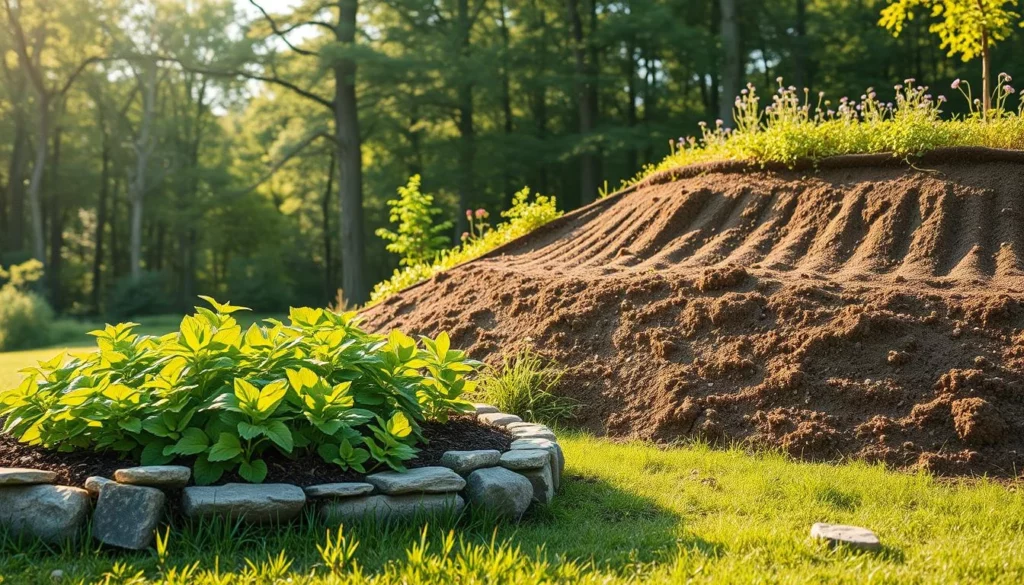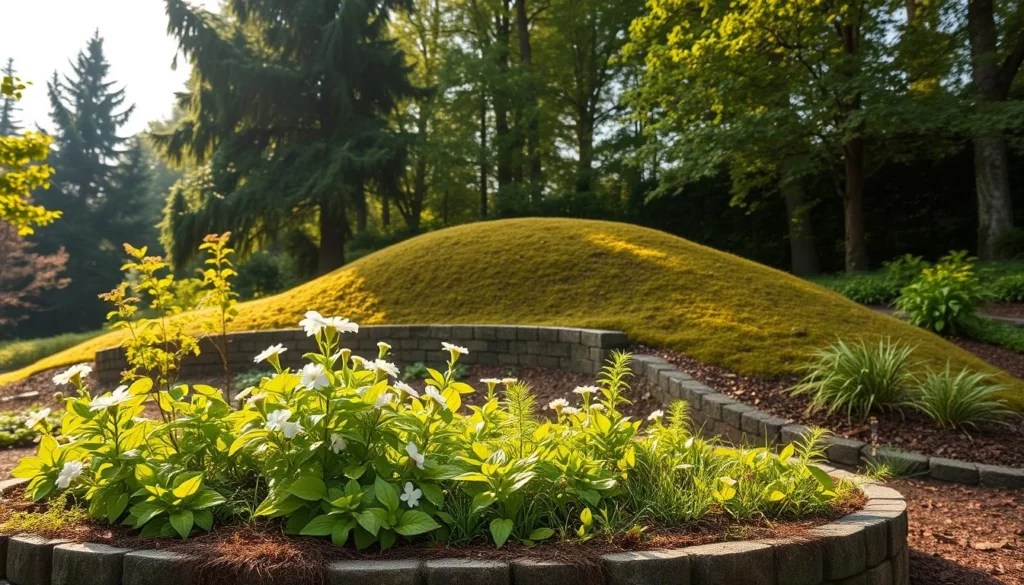You can make your outdoor space quieter by using natural barriers. Earth Berms and Raised Garden Beds are great for noise blocking and improving your Garden Design.
These earthy solutions can greatly reduce outside noise and make your space calm. Studies show that earth berms can cut down sound from nearby homes. They’re perfect for quieting your area.
Designing a soundscape garden with raised beds and berms can make your outdoor area more peaceful. This guide will show you how to use these natural barriers to enjoy a quieter space.
Understanding Noise Pollution and Its Effects
You might not realize it, but noise pollution is a big problem. It can harm your health in many ways. Noise pollution is when we have too much unwanted sound around us.
This issue is not just a bother. It has serious effects. To understand how serious, let’s look at what noise pollution is.
What is Noise Pollution?
Noise pollution is any sound that bothers or hurts us. This includes sounds from traffic, construction, and loud music. Any sound over 70 decibels is harmful.
Common Sources of Noise
Here are some common sources of noise pollution:
- Traffic: Cars, trucks, airplanes, and trains are big contributors.
- Construction: Building and demolition make a lot of noise.
- Industrial activities: Factories and plants produce a lot of noise.
- Recreational activities: Loud music and fireworks also add to the noise.
The Impact on Health and Well-being
Noise pollution affects our health in many ways. It can make us stressed, disrupt sleep, and even harm our hearts. It can also hurt our brains in children. And, loud noises can cause permanent hearing loss.
Knowing these effects helps us fight noise pollution. By understanding where it comes from and how it affects us, we can take steps to reduce it.
Introduction to Earth Berms
Earth berms are a simple yet effective way to block out unwanted noise. By adding earth berms to your landscaping, you can greatly reduce noise from neighbors or busy roads.
Definition and Design of Earth Berms
An earth berm is a mound of soil built to block noise. The design can change based on its purpose. For noise reduction, it’s made dense and tall.
The berm’s density and height affect its noise-blocking power. A denser berm with more plants absorbs sound better.
Benefits of Using Earth Berms
Earth berms as noise barriers have many benefits. They not only cut down on noise but also make your garden look better.
- Enhance the visual appeal of your garden
- Support local biodiversity by providing habitat for various plants and animals
- Can be designed to fit various garden sizes and layouts
| Benefits | Description |
|---|---|
| Aesthetic Appeal | Earth berms can be landscaped to enhance the beauty of your garden |
| Biodiversity Support | They provide habitat for various plants and animals, supporting local biodiversity |
| Flexibility | Can be designed to fit various garden sizes and layouts |
How Earth Berms Work as Noise Barriers
Earth berms block noise by absorbing and deflecting sound waves. The earth’s density and any plants help break down sound energy. This reduces the noise that reaches your garden or home.
Adding dense plants to the berm can make it even better at blocking sound. Plants with thick leaves absorb more sound, making the berm more effective.
Exploring Raised Garden Beds
Raised garden beds can make your outdoor space better for gardening and reducing noise. They are loved by gardeners for many reasons.
What are Raised Garden Beds?
Raised garden beds are plots of soil on frames made of wood, stone, or composite. They help with drainage and soil health. They also make it easier to plant and care for your garden.
These beds can fit any garden size or shape. They are great for both small backyards and large estates. You can make them fit your garden perfectly.
Advantages of Raised Garden Beds
Raised garden beds have many benefits. They improve soil and drainage, helping plants grow better. They also make it easier to fight weeds and pests without chemicals.
- Better drainage and soil aeration
- Improved accessibility for gardening
- Enhanced aesthetic appeal
- Extended growing season
- Customizable design
They also make your garden look better. You can pick the frame material to match your garden’s style.
Noise Reduction Capabilities of Raised Beds
Raised garden beds can also reduce noise. Dense plants and smart placement help absorb sound. This makes your garden quieter.
To get the most noise reduction, use dense plants and layers of different plants. This boosts the sound-absorbing power of your raised beds. Your garden will be quieter and more peaceful.
By adding raised garden beds to your garden design, you can create a calm oasis. It will look great and feel peaceful.
Comparing Earth Berms and Raised Beds
If you want to cut down on outdoor noise, knowing the difference between earth berms and raised beds is key. Both can help reduce noise, but in different ways.

Key Differences Between the Two
Earth berms are made of soil and can be built around your garden or property to block noise. They work well because of their density and height, which absorb sound waves. Raised garden beds, on the other hand, are elevated areas for plants. They help with noise, but not as much as earth berms.
Earth berms are bigger and more solid, making them better at blocking noise. Raised beds are smaller and good for gardening, but not as effective at blocking noise on their own.
Which Option is Better for Your Space?
Choosing between an earth berm and a raised bed depends on several things. These include your garden’s size, the noise level you want to reduce, and your gardening needs. If you’re facing a lot of noise, an earth berm might be better. But if you want something that’s good for gardening too, a raised garden bed could be the better choice.
Factors to Consider Before Choosing
Before making a decision, think about these factors:
- The size and layout of your garden or property
- The level of noise you’re trying to reduce
- Your budget for the project
- Your gardening needs and preferences
- The overall aesthetic you wish to achieve
By considering these, you can choose the best option for both noise reduction and garden design.
The Science Behind Noise Blockage
The science shows that the right mix of density and height in barriers can cut down unwanted noise. For outdoor soundproofing, knowing how barriers work with sound waves is key. Barriers can either soak up sound, making it less intense, or bounce it off, changing its path.
How Barriers Affect Noise Levels
Barriers can greatly change noise levels by either soaking up or deflecting sound waves. How well a barrier works depends on its ability to absorb or deflect sound. Effective noise-blocking barriers aim to do both well.
Role of Density and Height in Sound Reduction
The density and height of a barrier are key to its sound-reducing power. A denser barrier absorbs sound better, while a taller one blocks sound waves by stopping them from going over. Increasing the height of a barrier is a great way to cut down on noise.
Understanding Sound Waves and Barriers
Sound waves are energy that moves through the air. When they hit a barrier, they can be absorbed, reflected, or diffracted. The way sound waves and barriers interact is complex and depends on both. Knowing this is crucial for designing sound absorption techniques.
Understanding the science of noise blockage helps you choose the right outdoor soundproofing solutions. Whether it’s noise from a neighbor or a busy street, the right barrier can greatly improve your life.
Designing Your Garden with Noise Control in Mind
To fully enjoy your outdoor space, think about noise control when designing it. A well-planned garden can greatly reduce unwanted noise. This makes your space more peaceful. It involves careful planning, choosing the right materials, and thinking about looks.
Planning and Layout Tips
Good garden design for noise control starts with planning and layout. Look at your land’s natural shape and how it can help. For example, earth berms can block noise well.
When designing your garden, think about where noise comes from and how to block it. Use raised beds as buffers. Think about how sound moves through your garden.
- Identify primary noise sources.
- Determine the most effective barrier locations.
- Consider the overall aesthetic you wish to achieve.
Materials to Use for Effectiveness
The materials you pick are key for noise reduction. Dense materials like wood, brick, or stone work well. For earth berms, mix soil with dense plants for better sound blocking.
For raised beds, the frame material and plant choice matter. Dense foliage and broad-leaved plants absorb sound well.
Aesthetic Considerations for Your Space
Don’t forget about your garden’s look while focusing on noise control. Pick plants and materials that reduce noise and look good. Mix textures, colors, and heights for a lively space.
Your garden should show your style and act as a natural noise barrier. By mixing function with beauty, you’ll have a calm and lovely outdoor area.
Plant Selection for Sound Absorption
Using plants in your garden can help reduce unwanted noise. By picking plants that absorb sound well, you can make your garden quieter. It’s important to know which plants work best for this.
Best Plants for Noise Reduction
Some plants are better at blocking sound than others. Look for plants with thick leaves and tall, strong stems. Here are a few examples:
- Dense shrubs like boxwood or holly, which can be planted closely together to form a dense barrier.
- Tall trees such as evergreens, which not only absorb sound but also block the line of sight, enhancing privacy.
- Bamboo, known for its dense foliage and ability to absorb a wide range of frequencies.
The Role of Foliage Density and Height
How well plants absorb sound depends on their leaves and height. Plants with thick leaves catch sound waves better. Taller plants can stop sound waves from reaching your garden.
| Plant Type | Foliage Density | Height | Sound Absorption Effectiveness |
|---|---|---|---|
| Dense Shrubs | High | Medium | High |
| Tall Trees | Medium to High | High | Very High |
| Bamboo | High | Medium to High | High |
Seasonal Planting Strategies
To keep your garden quiet all year, use seasonal planting. Mix evergreen and deciduous plants for constant foliage.
Evergreen plants like holly or pine keep their leaves all year, absorbing sound constantly. Deciduous plants change with the seasons, adding variety to your garden.
DIY Steps for Building an Earth Berm
Building an earth berm can make your outdoor space quieter. It’s a natural way to block noise. Plus, it looks great in your yard.
Essential Tools and Equipment
First, get the right tools for your earth berm. You’ll need:
- A shovel for digging and moving soil
- A wheelbarrow for transporting heavy loads of dirt
- A rake for leveling and smoothing the surface
- A compactor or tamper to ensure the soil is densely packed
- Seeds or plants for covering the berm
Step-by-Step Construction Guide
Here’s how to build your earth berm:
- Plan your earth berm: Decide on size and location based on noise and design.
- Mark the area: Use stakes and twine to outline the berm’s spot.
- Dig and fill: Dig a bit deeper than the height, then fill with soil and compost or gravel.
- Shape the berm: Use a rake to shape it, making sure it’s stable and looks good.
- Compact the soil: Use a compactor or tamper to keep it stable.
- Plant vegetation: Add grass, shrubs, or plants to improve looks and noise reduction.
Maintenance Tips for Longevity
To keep your earth berm working well, follow these tips:
- Check for erosion or settling regularly.
- Water plants right to keep them healthy.
- Trim or replace plants as needed.
- Fix any damage from bad weather.
By following these steps and tips, you’ll enjoy a quieter space. Your earth berm will be a natural barrier against noise.
Building Raised Garden Beds for Aesthetics and Function
You can make your garden look better and be quieter by adding raised garden beds. These beds are great for making your outdoor area both beautiful and useful.
Materials Needed for Construction
To make raised garden beds, you’ll need a few key things. These include:
- Wood or composite materials for the frame
- Soil and compost for planting
- Gravel or landscape fabric for drainage
Think about how durable, affordable, and good-looking the materials are. Cedar wood is a favorite because it doesn’t rot or get eaten by bugs.
Simple Design Ideas for Raised Beds
Raised garden beds can be many shapes and sizes. Here are some easy ideas:
- Create a rectangular bed with a simple wooden frame
- Use a tiered design to add visual interest
- Incorporate a trellis or arbor for climbing plants
Tips for Effective Gardening with Noise Control
To get the most out of your raised garden beds for noise control, try these tips:
| Tip | Description | Benefit |
|---|---|---|
| Plant dense foliage | Choose plants with thick leaves or needles | Effective sound absorption |
| Use a layered planting approach | Combine plants of varying heights and densities | Enhanced noise reduction |
| Incorporate sound-absorbing materials | Add materials like mulch or straw | Improved sound absorption |
By using these tips and adding raised garden beds to your garden, you can make a quieter and more enjoyable outdoor space.
Maintenance of Earth Berms and Raised Beds
Earth berms and raised garden beds need regular care to keep them working well. This care boosts their function and looks. It makes your outdoor area more beautiful.
Routine Care for Earth Berms
Regular checks are key to keeping earth berms in good shape. Look for erosion, settling, or damage from weather or pests. Fix the berm by adding soil or repairing holes.
- Make sure plants on the berm are healthy and thick to stop soil erosion.
- Trim or prune plants often to keep them the right size and height.
- Use mulch or other methods to keep moisture in and weeds out.
How to Maintain Raised Garden Beds
Raised garden beds need ongoing care to stay productive and look good. Water them regularly, but don’t overdo it. Too much water can harm the soil and plants.
| Task | Frequency | Benefits |
|---|---|---|
| Watering | Daily/Weekly | Keeps the soil moist |
| Fertilizing | Monthly | Gives plants the nutrients they need |
| Pruning | As needed | Helps plants grow well |
Seasonal Considerations
Seasonal changes affect earth berms and raised garden beds. In spring, check for winter damage and fix or replace soil or plants. In summer, water regularly and watch for pests. In fall, clean up and get your garden ready for winter with coverings or mulch.
By following these tips, your earth berms and raised garden beds will stay effective and lovely all year. They’ll make your outdoor space more private and peaceful.
Conclusion: Reap the Benefits of Natural Noise Barriers
You can cut down on outdoor noise by using Earth Berms and Raised Garden Beds. These natural barriers make your garden look better and make it quieter. They help create a peaceful place outside your home.
Long-term Benefits
Earth Berms and Raised Garden Beds are great for keeping noise out. They make your garden quieter and more peaceful. Using them can really help reduce outdoor noise.
Creating Your Peaceful Oasis
Designing your garden to block noise can make it a calm spot. Choosing the right plants and adding Earth Berms or Raised Garden Beds boosts your garden’s quietness. This makes your outdoor space a peaceful retreat.
Embracing Nature’s Solutions
Nature has its own ways to fight noise pollution. Using Earth Berms and Raised Garden Beds as natural barriers makes your environment quieter. This approach not only cuts down on noise but also supports a healthier, greener lifestyle.




